Operation Iron Swords - Day 235 - 28 May 2024
“At any point, Hamas could have ended this burgeoning tragedy to
surrender and release every hostage. …
Hamas instigated and owns this humanitarian catastrophe.”
Sen. John Fetterman (D-PA)
Contents |
|
NEW - War Termination NEW - Operations NEW - Operations - Gaza NEW - Operations - Judea-Samaria NEW - Operations - Lebanon NEW - Operations - Syria / Iraq NEW - Operations - Yemen UPDATED - Operations Maps NEW - By-Standers NEW - Axis of Resistance NEW - Allied for Democracy UPDATED - By the Numbers |
Contrary to reports from the last few hours, the IDF did not attack the humanitarian area in Al-Mawasi. Medics say that Israel bombed the tents of displaced families in the humanitarian area in Al-Mawasi. The authorities in Gaza said on Tuesday that “new Israeli raids on a tent area housing displaced persons” west of Rafah caused deaths and injuries, while the Israeli army denied carrying out this strike. Reuters quoted medics and residents as saying that the new Israeli raids targeted “the tents of displaced families in the designated humanitarian area in Al-Mawasi (..).”
On the other hand, the Israeli army denied this information. The army said in a brief statement: “Contrary to reports received in the past few hours, the IDF did not launch an attack in the humanitarian area in Al-Mawasi.” The Israeli army has always said that its strikes only target militants and the infrastructure of armed groups.
The Al-Alam News Channel [Islamic Republic of Iran Broadcasting] correspondent in the Gaza Strip reported that the Israeli army has been carrying out violent raids in the last hours in the Al-Mawasi area, far west of the city of Rafah, and targeted a number of tents, leading to the death of more than 20 Palestinians. The area was also targeted earlier today and the day before yesterday. He added that there were a large number of martyrs and wounded, because the targeting was directly at the tents of the displaced, with artillery and air strikes, noting that most of the martyrs were children, women and the elderly. He explained that entire Palestinian families were killed within moments, in areas where the Israeli army asked residents to be present as safe areas, namely the Rafah and Khan Yunis waterways. He stressed that the occupation, through these crimes, wants to evacuate the city from east to west, which is evident through the advance of the occupation forces and tanks from several axes, including the Philadelphia axis and the Al-Awda Mosque.
The Palestinian News Agency reported on Tuesday that the Israeli army committed a “new massacre” targeting displaced people in the Rafah suburbs, south of the Gaza Strip, leaving dozens dead and wounded, the majority of whom were children and women. Fierce clashes and violent bombing in Rafah and destruction of residential neighborhoods in Jabalia and northern Gaza.
Wafa Agency reported, quoting local sources, that “the occupation aircraft launched raids during which at least several missiles were launched, targeting the tents of the displaced in the Al-Mawasi area in Rafah.” The agency added, according to a source in the Civil Defense, that “there were more than 21 martyrs as a result of an Israeli bombing that targeted the tents of displaced people in Mawasi Rafah,” while the Rafah Emergency Committee said: “The occupation committed a new massacre of war and genocide that targeted the tents of the displaced in the safe areas of Mawasi.” "Wafa" indicated that "the occupation forces killed 72 displaced people within 48 hours by bombing tents in allegedly safe areas west of Rafah."
War Termination
There is a disagreement among the members of the War Cabinet regarding Hamas's demand to end the war, it was announced this evening (Tuesday), in the evening news at Khan 11. Some ministers believe that this clause can be negotiated, but Prime Minister Netanyahu and his entourage continue to claim that agreeing to the demand is surrender to Hamas. A document presenting Israel's position on the outline of a kidnapping deal was handed over to the mediators. Egypt and Qatar presented it to Hamas after the tripartite summit held in Paris over the weekend. The mediators presented Israel's updated position, in which they are willing to be flexible regarding the number of abductees to be released in the first phase, which is defined as a humanitarian phase.
It was also published in the evening edition that an Israeli official involved in the negotiations said that this is "the last chance to return the abductees and make a deal". According to him, "Both we and the mediators understand this. If there is no deal, the IDF will enter Rafah and the abductees will not be released. In the meantime, the kidnapped are dying, and it could get worse." Last night it was published in the edition that Israel handed over the proposal document approved by the war cabinet to the mediators. The proposal is defined in Israel as "realistic and has a chance".
Western officials involved in the negotiations conveyed the message to Israel that Hamas understands that it will not control the Gaza Strip the day after the war, as N12 TV News published this evening (Tuesday) in the "Main Edition". The same sources also told Israel that it should challenge the leader of Hamas, Yahya Sinwar, and put on the table a comprehensive proposal, in which Israel would refer to a long-term ceasefire, the restoration of the Strip, a governing alternative to Hamas and the exile of the leaders of the murderous terrorist organization. This, to test Sinwar's response. Despite this, Prime Minister Benjamin Netanyahu is not at all ready to discuss these issues.
Israel submitted an updated "far-reaching" offer to Hamas through the mediators, which includes Israeli readiness to discuss a long-term ceasefire already at the end of phase one of the deal. The Chief of Staff Major General Herzi Halevi also supports this position and believes that the abductees should be returned, and that the army will know how to return to fighting afterwards. At the same time, the security establishment has a great desire to take advantage of the intense operation in Rafah to exert pressure on Sinwar.
Officially, Hamas says it will not negotiate while fighting in Rafah, but in Israel there is appreciation and hope that the mediators know how to contact the murderous terrorist organization's senior officials behind the scenes. The mediators are supposed to deliver the Israeli proposal to Hamas.
In the war cabinet, there is an agreement of the ministers and the heads of the defense establishment that it is right to end the activity in Rafah and give priority to the hostage deal, but Prime Minister Netanyahu opposes. The supporters of the process believe that Israel should enter the first phase of a deal and thus promote a dynamic for agreement later on.
In a conversation with the parents of the abducted soldiers and female soldiers, the Chief of Staff clarified that the ultimate goal is indeed the dissolution of Hamas, but at this stage there is a chronological priority for the release of the abductees. Referring to Hamas's demand to stop the war, Halevi said that the IDF will know how to return and fight. The Chief of Staff also emphasized that the military pressure has a lot of meaning now, and added - if we take the pressure off completely, it will be difficult to reach an agreement.
At the beginning of the cabinet meeting, Netanyahu reprimanded: "The leaks coming out of the negotiation team are a scandal. We agreed on confidentiality. I have always expanded the mandate at your request when necessary. The briefings against me are false, you are harming the negotiations." Netanyahu made a similar public statement on the podium of the Knesset when he claimed that he had already approved the expansion of the mandate five times.
Operational Update
In a brief comment on the Rafah strike, U.S. Vice President Kamala Harris said, "The word tragic doesn’t even begin to describe it."
Israeli army spokesman Daniel Hagari stressed that the air strike alone “could not” have caused the deadly fire. He said: "Our ammunition alone cannot start a fire of this size." He added that the army launched two projectiles carrying 17 kilograms of "explosive materials" at a site that targeted two senior Hamas leaders.
According to the initial findings of the IDF investigation, the fire ignited 100 meters away from the target of the attack, and ignited due to shrapnel hitting a fuel tank. An American source confirmed this morning (Tuesday) the information he received from an Israeli source on the ABC network. According to the same source, the United States announced that it is still in the process of understanding what happened, and is waiting for Israel to conduct its own investigation and determine what action to take. According to the military investigation, the Air Force carefully selected missiles to fit the mission.
The Israeli bombing of a camp for displaced people northwest of Rafah, causing a fire to break out, killing 45 people, and wounding 249 others, according to the Ministry of Health in the Gaza Strip. The Israeli army announced that it had opened an investigation into the raid. He announced that he had targeted a Hamas compound and killed two leaders in the raid. Prime Minister Benjamin Netanyahu described the strike as a "tragic incident."
Israeli Prime Minister Benjamin Netanyahu is facing increasing pressure to stop military operations in Rafah, and this pressure has increased after the recent raid on a camp for displaced people in the densely populated area. The raid, which caused the burning of tents and the killing of dozens of displaced people, confirmed the fears that preceded the invasion of Rafah on May 8 about civilian casualties in an area to which about 2.3 million people have already been displaced.
The Israeli invasion of Rafah forced thousands of Palestinians to flee the city, to which about half of the Strip's population was displaced. The United Nations Relief and Works Agency for Palestine Refugees (UNRWA) announced on Tuesday that about one million people had fled the city during the past three weeks, warning that it had become “almost impossible” to provide support and protection to these people. Following the raid, an Egyptian soldier was killed in an exchange of fire between Israeli forces and Egyptian forces on both sides of the Rafah crossing, which Israel took control of after the invasion. Egypt warned that the Israeli incursion into Rafah could threaten the peace treaty signed between the two countries decades ago.
The Israeli newspaper Haaretz considered, in an analysis of the situation, that the incident reflected the intensity of tension “with the meeting of the three borders, which intensified significantly with the Israeli army’s incursion into Rafah.” After international condemnation that followed Sunday's raid that killed 45 people and injured 249 others, it was announced, on Tuesday, that at least 21 people were killed in a new Israeli raid on a camp for displaced people west of the city of Rafah.
Reactions continued denouncing the raid carried out by Israel in a camp for displaced people in Rafah, in the far south of the Gaza Strip, on Sunday, after civilians were killed in the raid. The Ministry of Health in Gaza announced, on Monday, that the death toll from the Israeli bombing in the Tal al-Sultan neighborhood in northwest Rafah had reached at least 45 people, and 249 others were injured. The two raids came in the wake of a decision by the United Nations International Court of Justice demanding that Israel stop its military attack on Rafah, and open the Rafah border crossing to allow more humanitarian aid to enter the Strip without hindrance.
The UN Security Council decided to hold a closed emergency session on Tuesday afternoon regarding the situation in Rafah at the request of Algeria, the Arab representative in the Council. As international pressure mounted, Irish Foreign Minister Michael Martin announced that European Union foreign ministers held “for the first time an important discussion about imposing sanctions on Israel if it does not adhere to international humanitarian law,” according to what was reported in the American magazine Politico. “There was a very clear consensus on the need to support international humanitarian legal institutions,” Martin told reporters, on Monday, after the European Union Foreign Affairs Council held.
The last two raids raised questions about the extent of their impact on the future of Netanyahu and his right-wing coalition, and about the possibilities that they might lead to a change in government policy and an eventual cessation of the war. For his part, the Israeli army announced on Monday that it had opened an investigation into Sunday's raid, after it said it had targeted Hamas officials with "precision munitions," while the Prime Minister described the strike as a "tragic accident," indicating that his government was "investigating it."
The Military Advocate General said, on Monday, at an Israeli Bar Association conference in Eilat that the allegations against Israel regarding the deliberate killing of civilians are baseless. He revealed that since the beginning of the war, about 70 military police investigations have been opened into suspicions of criminal behavior by soldiers, including investigations related to the treatment of Palestinian detainees at the Sde Timan base.
Haaretz newspaper said that it was possible that fragments from one of the bombs that fell in Sunday's raid had drifted into the camp, causing a large fire there. Army sources denied to Haaretz that some reports said that seven bombs, each weighing one ton, were dropped on the site. She said: "Two bombs were dropped in the attack." The Israeli government's Foreign Press Department said that before the raid in Rafah, "an assessment concluded that there would be no unforeseen harm to civilians." It added that the Fact-Finding and Evaluation Mechanism of the IDF General Staff “is investigating the circumstances of the deaths of civilians in the area after the raid,” and that the IDF “regrets any harm caused to non-participating civilians during the fighting.”
In a previous statement to Al-Hurra website, Kobi Michael, a senior researcher at the Institute for National Security Studies in Tel Aviv, who served as deputy director of the Palestinian office in the Ministry of Strategic Affairs, said that Israel “did not target, on Sunday evening, a camp for the displaced, but rather a building in which there was a camp.” Hamas terrorists used it as a military compound, and therefore, according to international law, it is a legitimate military target,” according to his statements to Al-Hurra website. Michael added that the Israeli army "took all precautionary measures to ensure that any collateral damage is prevented."
An expert on Middle East affairs at the International Crisis Group, Joost Hiltermann, said in new statements to Al-Hurra website, on Tuesday, that after Sunday’s raid, Netanyahu’s position may become “more and more unacceptable as his justifications for Israeli atrocities in Gaza accumulate, which leads to the erosion of support for his country from Western capitals, and increasing pressure from Israel’s allies and from within the local political system.”
Israeli affairs expert, Jalal Banna, points out the increasing international pressure, especially American pressure, on Israel, which is “troubling the security apparatus, especially with regard to the continued supply of equipment and weapons to Israel.” Bana, who lives in Israel, believed that the decisions of the International Court put Netanyahu in a dilemma because the consequences would be great for him in the future. What Netanyahu is trying to do, according to Bana, who spoke to Al-Hurra website, is to continue security and military operations in Gaza in an attempt to prolong the life of his government, which will fall. Immediately after the end of the war was announced.
In statements to Al-Hurra website, Israeli political analyst Eddie Cohen said that he does not believe that "the so-called massacre will lead to stopping the Rafah operation. On the contrary, we saw tanks approaching the center of Rafah and we confiscated a huge amount of weapons." Cohen says that there is "pressure on Israel and everyone denounced Netanyahu, but he will continue the war even if it becomes a second or third massacre. Netanyahu is determined to eliminate Hamas and confiscate all weapons."
Political analyst Hassan Mneimneh, based in Washington, does not believe that there is great pressure on Netanyahu, but only “a great deal of media noise.” In an interview with Al-Hurra website, Mneimneh believes that Netanyahu will insist on continuing the Rafah operation, especially since Washington does not reject what Israel is doing despite the issuance of statements expressing dissatisfaction and crossing the red line. The Israeli newspaper Haaretz wrote in its editorial analysis: “The killing of civilians in Rafah may force Israel to cease fire even without the hostage deal.” She added, "The question now is whether this incident, which occurred two days after the International Court of Justice's decision, would increase international pressure aimed at a ceasefire, even without it being conditional on a deal to release the hostages."
On Monday, government minister Gadi Eisenkot, from the National Unity Party, said in a closed session of the Foreign Affairs and Defense Committee in the Knesset that the escalation of fighting in the Gaza Strip created a narrow window of time, estimated at about a week, to move forward with the peace process. Even before the Rafah raid, there was an internal warning from the families of the hostages that Israel would be forced to reach an agreement in which it would make concessions.
The Times of Israel quoted a statement by the mother of an Israeli hostage held in Gaza during their participation in a weekly demonstration on Saturday: “We must understand once and for all that the conditions for reaching an agreement have not changed. There will be no agreement without the end of the war.” She continued, saying: “If you do not reach "The government has reached an agreement now, and Israel will eventually be forced to end the war without the hostages returning."
Haaretz said that the forced evacuation did not solve the problem of fighting in a densely populated area (Rafah), as Rafah remained crowded with about 350,000 people remaining, and “because of the basic difficulty of the Rafah operation, in addition to the operation that is scheduled to end soon in Jabalia, north of Gaza, it is not related to "On the internal front, but rather by the accumulated pressure on the fighting forces."
This may lead to an “inflection point” for the Israeli public, which bears the burden as the war continues in the Gaza Strip and the towns on the northern border with Lebanon are exposed to heavy fire on a daily basis from Hezbollah. In his statements to Al-Hurra website, Cohen believes that what matters to Netanyahu is the American position, which carries “half rebuke and half condemnation,” and in the end, Washington “confirmed that Israel does not commit war crimes and demanded that Israel do what it wants, and American representatives are wondering why it let Russia do what it wants.” "It wants in Ukraine while Israel is rebuked for its behavior in Gaza."
Cohen says that, given the American position, Netanyahu can withstand the enormous pressure he is exposed to, as he “derives his strength from Washington.” As for the Europeans, “their position is ineffective and they only issue statements expressing condemnation in the strongest terms, and for more than 20 years they have been denouncing the construction of settlements.” What really matters to Netanyahu is the American position, which is a “good” position for him.
Patrick Clawson, a senior researcher at the Washington Institute for Near East Policy who spoke to Al-Hurra, believes that Netanyahu “does not feel that he is under much pressure to change course.” Clawson adds that he is under internal pressure from the left and right to either take a more aggressive path or a more flexible path, and in this way he was able to maintain his position, so he will continue his approach despite international pressure. He believes that Rafah is a complex urban war, and Netanyahu will continue to make all kinds of changes and tactics in order to isolate Gaza.
Mneimneh says that Netanyahu is ready for Israel to pay a price for its international reputation, but in terms of support, according to opinion polls, he has the support of the majority of the Israeli public. Mneimneh points out that there are voices working to conclude a deal for the hostages, but they are unable to attract the majority of the street. “There is sympathy for the hostage issue, but it will not lead to stopping the war to recover them.” He added: “We did not hear any influential voices regretting the killing of tens of thousands in Gaza, and the systematic destruction of the Strip. All the voices demanding a change in tone say they want to destroy Hamas, but “let us recover the prisoners first,” while the majority say that it is not permissible to delay in order to eliminate Hamas even before recovery of prisoners.
He asserts that Netanyahu is "a controversial figure, and many accuse him of various kinds of accusations, but he enjoys the support of the right, and if the center opposes Netanyahu, he can tolerate that." Mneimneh says: “There is no truth in talking about great pressure. There is a lot of media noise around him, but the elements that allow him to insist on his approach are still great, which are: popular support and Washington’s support.” He believe that Netanyahu's government failed to achieve the goals of the war, as it "did not occupy Gaza and only control its crossings as it had for nearly 20 years, and it did not achieve the first declared goal, which is to overthrow and eliminate Hamas."
He added: "Israel is struggling with its place. It was unable to return the kidnapped people except a small number. In return, it tried to exploit time by continuing negotiations, and was unable to establish security for its citizens, even in Tel Aviv." Banna added: “What Netanyahu is trying to do is procrastinate, but the biggest challenge he faces is the major crisis in the northern region and the fear that a war will start with the Hezbollah organization, which has so far managed, through marches and missiles, to remove tens of thousands of Israeli citizens from their homes and towns.” He believed that, "In the end, Netanyahu will have no choice but to complete the prisoner deal with Hamas, declare an end to the war, and agree and perhaps contribute to rebuilding the Gaza Strip. The Israeli security services, Mossad and Shin Bet, will continue to pursue Hamas leaders and try to liquidate them."
The "Israeli Eye" program [ Alalam News Network. Islamic Republic of Iran Broadcasting] highlights the comments of analysts and experts in the Hebrew media studios about the Rafah massacre and about field and political developments in the Israeli entity, including the specific Jabalia camp operation and the missile attacks on Tel Aviv and the Gaza Strip. The program shed light on the conduct of communications regarding ceasefire negotiations and the exchange of prisoners, and on the massacre committed by the Israeli occupation in the displaced persons camp in Rafah and the killing of an Egyptian soldier at the border by the occupation forces, as Israeli military censorship imposed a ban on publishing details of what happened.
Regarding the Israeli goal of committing the Rafah massacre at this time and putting pressure on the course of the negotiations, and about the reason why the occupation media treated it with such disdain, as Netanyahu considered it a disastrous mistake that is being investigated, Samer Karaki, an observer of Israeli affairs, confirmed that there is no response to all the victories of the resistance, especially after the seizure of power. The initiative taken by the resistance, whether in Gaza or in southern Lebanon, only led to the continuation of more massacres, especially in the last field situation of the occupation army, which was Rafah.
Karki pointed out that the Zionist entity has no choice but to continue the policy of massacres, but there is an almost formal change after the visit of William Burns, director of the CIA, but the Israelis are trying to circumvent the clauses in these clauses that are carried out by mediators under American sponsorship, and he has no choice but to continue these massacres. And circumvent these terms.
Karki noted that Benjamin Netanyahu clearly said in the War Council that there are new visions, but the new visions from which he starts are a process of circumvention related to the second and third phases. The second phase that the mediators began with relates to the exchange of prisoners of Israeli officers and soldiers with Palestinian prisoners, and talk about the end of War or a sustainable end to the war, and the third stage is the exchange of bodies, as the Israelis clearly want there to be an exchange of prisoners and talk about the end of the war and the beginning of the third stage in order to continue it.
Further to the warnings in the Metula area: this is a false identification. Further to the warning that was activated in the level area, this is a false identification. Following the warning about the infiltration of a hostile aircraft in the north of the country a short time ago, this is a false identification. Following the alert that was activated in the area of Kfar Giladi, this is a false identification.
The Home Front Command's hazardous materials exercise will take place tomorrow (Wednesday) in Nesher. During the exercise, a warning will be issued that will be sounded by horns about dangerous substances. The alert will also be distributed in the Home Front Command application, along with the caption "Exercise". If a true warning is activated, a rising and falling alarm will sound and a true warning will be disseminated through the supplementary warning means. More information can be found at the home front command center at 104, via WhatsApp messages at 052-9104104, at the national portal at: oref.org.il and on social networks.
Operational Update - Gaza
The United Nations Relief and Works Agency for Palestine Refugees (UNRWA) said that about one million civilians were displaced from Rafah city after Israeli orders to evacuate.
The US Department of Defense (the Pentagon) said on Tuesday that the military naval pier off the coast of the Gaza Strip will be removed for repairs, and will be returned as soon as they are completed. Pentagon spokeswoman Sabrina Singh said in a press conference that the repair of the naval pier will take a week, and will take place in the Israeli port of Ashdod. The floating dock, which the United States began building last month, at a cost of at least $320 million, aims to deliver more humanitarian aid to the Gaza Strip, where it began operating earlier in May. Two American officials told Reuters on Tuesday that part of the pier that the US army had established off the Gaza Strip was separated and temporarily taken out of service, in the latest blow to efforts to deliver humanitarian aid to the Palestinians. The two officials, who requested that their names not be published, added that it is believed that bad weather is the reason for the separation of this part. The two officials did not disclose the size of the separated section or how long the pier would need to resume its operations.
Last March, US President Joe Biden announced for the first time plans to establish a floating dock in light of Israel’s obstruction of the delivery of aid by land, which exacerbated the deteriorating humanitarian conditions in Gaza. The mechanism provides for the transfer of aid primarily from Cyprus on commercial ships to the floating platform that the US military has completed construction. The aid is then transferred to smaller ships that deliver it to the pier attached to the coast, and eventually to land, after loading it into trucks for distribution. A spokesperson for the UN World Food Program reported that 137 trucks carrying the equivalent of 900 metric tons of aid have been transported from the pier to Gaza.
In the last month, the Carmeli Brigade (2) has been fighting in the Gaza Strip under the leadership of Division 99. The brigade operates in the area of the corridor and took part in the operation that took place in the Zeytun neighborhood where the forces eliminated close to a hundred terrorists and destroyed hundreds of terrorist targets. Locating a large anti-aircraft missile and destroying a rocket launch complex: documentation of the Nahal TSA war in Rafah.
As part of the 98th Division's activity in the northern Gaza Strip, the paratroopers' brigade combat teams, 460 and 7, eliminated terrorists and located weapons in the area. In the past day, the fighters have destroyed dozens of terrorist infrastructures in the Jabaliya area, including underground shafts, observation posts, a military depot, and a military building from which the terrorist organization Hamas conducted its fighting. In one of the activities, the forces of the division directed Air Force fighter jets that closed a circle and eliminated a terrorist squad that fired mortars at the fighters operating in the area.
The brigade combat teams of the 162nd division, joined by the Tsakh and Bislah, continue their activities in the Rafah area. The forces of the combat teams of the 401 and Nahal brigades operated during the night on the Philadelphia axis against terrorist targets and infrastructures and are operating in the field precisely and following intelligence information indicating the presence of terrorist targets in the area. The activity is done with efforts to avoid harming those not involved. The forces are conducting battles with terrorists, locating underground shafts in the area, alongside weapons and other terrorist infrastructure.
The forces of Division 99 led by the combat team of Brigade 679 are expanding their activities in the center of the Gaza Strip. During the last day the forces identified terrorists staying in the building next to them, a short time later a fighter jet attacked the building and eliminated the terrorists. At the same time, the forces continue targeted raids on terrorist targets in the area. In one of the raids that were completed, the forces located an Amalah warehouse.
Israeli tanks have reportedly reached the center of Rafah as the Israel Defense Forces (IDF) continued its operation in the Palestinian city on Tuesday. The armored vehicles could be seen near Al Awda mosque, a city landmark, Reuters reported, citing witness accounts.
Operational Update - Judea-Samaria
The security forces arrested 8 wanted persons throughout Judea and Samaria tonight. In Burka in Benjamin, dozens of suspects were interrogated and incendiary materials were confiscated. In Gilzon, in the brigade's sector, a wanted man was arrested and means for making explosives were confiscated, and in Kfar Aqab, in the brigade's sector, the forces arrested another wanted man.
In Samou in Yehuda, the forces located and confiscated an "M16" type rifle along with other weapons and arrested two wanted persons. In Harsa and Dahariya in the brigade's sector, the forces arrested two wanted persons and in Beta, in the brigade's sector, the forces located weapons. In Kalkilia in the Ephraim Brigade, the forces arrested a wanted person and in Deheisha in Zion another wanted person was arrested and many suspects will be interrogated. The wanted persons who were arrested and the means of warfare that were confiscated were transferred to the security forces for further treatment, there are no casualties to Israeli forces.
The Israeli army stormed various areas in the West Bank and arrested a number of Palestinians, using machinery and bulldozers, and also deployed snipers on rooftops. The occupied West Bank was not immune to incursions and raids into various areas, in parallel with the Israeli operation that continued for more than 7 months on the Gaza Strip. Incursions included confrontations between resistance fighters and occupation forces, in addition to settler attacks on Palestinian citizens and their property.
Two Palestinians were taken to the hospital after being injured in an attack carried out by settlers in Hebron, amid a campaign of incursions by the occupation army that targeted the village of Kharsa, the city of Al-Dhahiriya, and the town of Al-Samu’, south of Hebron, and a citizen was arrested. The Israeli army, armed with military vehicles and bulldozers, stormed Balata camp, east of the city of Nablus in the West Bank, and also deployed snipers on the roofs of houses. On the other hand, Palestinian resistance fighters responded to the invading forces by shooting them and planted explosive devices in the path of the vehicles, which led to the damage of an Israeli bulldozer. In the Dheisha camp, east of Bethlehem, the Israeli forces raided dozens of homes and arrested eight Palestinians.
In the Kafr Saba area, the far north of the West Bank, the Israeli forces raided Palestinian homes and arrested two young men amid confrontations that took place between the invading forces and Palestinian resistance fighters. The Israeli forces stormed the village of Burqa, near Ramallah, and arrested four young men after beating them and tampering with the contents of their homes. In the town of Al-Issawiya, east of occupied Jerusalem, the Israeli forces arrested a Palestinian boy after raiding his family’s home.
The Israeli army also closed the entrance to the town of Ni'lin, west of Ramallah, while its forces stormed the Jalazoun camp in the north and arrested the citizen Ola Ibrahim Dalaysha, her son Walid Maher Dalaysha, and a young man from the camp. The Israeli forces also imposed strict military measures on the Israeli military Hamra checkpoint in the northern Jordan Valley area in the occupied West Bank, causing a stifling traffic jam.
The Israeli's violations did not stop with the repression campaigns and raids carried out by the army. Rather, Homesh settlers in the northern West Bank contributed to the attacks and burned agricultural crops and a sheep barn in the village of Burqa, northwest of Nablus.
Operational Update - Lebanon
Prime Minister Benjamin Netanyahu visited the IDF Northern District Intelligence Branch base on Tuesday, stressing the state's unwavering commitment to ensure that evacuated residents can safely return to their homes. He was joined by Intelligence Branch Commander Maj.-Gen. Aharon Haliva and Unit 8200 Commander Brig.-Gen. Y. During his visit, Netanyahu received a detailed briefing on the intelligence picture and the threats in the northern sector. He spoke with officers and soldiers about their service and their significant contributions during this critical period. The Prime Minister commended their involvement, noting, "I hear you and I see your determination. I see the fire in your eyes and I would tell the citizens of Israel: This is the iron wall of the State of Israel."
Air force fighter jets attacked several terrorist targets of Hezbollah in Lebanon. Among the targets that were attacked, a munitions warehouse in the area of ??Miss al-Jabal and military buildings of the organization in the areas of Aita al-Sha'ab and al-Khyam. Three anti-tank missiles were detected that crossed Lebanese territory towards the Shetula area, there were no casualties.
A Hebrew report stated that 930 rockets and shells had fallen on northern Israel since the beginning of the exchange of fire between Hezbollah and Israel (following the Hamas launch of Operation Al-Aqsa Flood on October 7). According to the Northern Horizon Directorate of the Israeli Ministry of Defense, since the beginning of the war, Hezbollah has launched more than 3,000 rockets, shells and drones towards the northern Israeli towns, causing severe damage in the area and all its residents were evacuated. According to the directorate, these bullets have so far caused material damage in 86 localities.
Israeli Channel 12 quoted security officials who pointed out the “catastrophic situation” in the north, and that residents who were evacuated from the most affected towns and villages in the region will not be able to return to live there until about a year after the end of hostilities, which is the time needed for rehabilitation. Homes. It was noted that in Kibbutz Manara, 130 homes out of 155 were destroyed, in addition to many public buildings. Data from the Northern Horizon Directorate stated that about 450 private homes and 200 public buildings in the region were damaged, and that this damage does not include major damage to infrastructure.
According to the report, most of the damage (70%) in the north was caused to private homes, then to public buildings (18%), and the rest was damage to infrastructure and other property (13%). About a quarter of it was caused by Israeli army forces during operational movements, while the rest was caused by Hezbollah fire. God,” especially anti-tank missiles. Of the 930 property damages, 318 were classified as moderate to major. The directorate stated that 80,000 residents of northern Israel have been evacuated since October 7 and transferred to hotels or hosting homes. Many say they do not want to return to live in the region after the war, because of the continuing threat posed by Hezbollah.
It is worth noting that Israeli Defense Minister Yoav Galant ordered the establishment of this directorate against the backdrop of the escalation on the northern border. The directorate will work to enhance security and establish civilian infrastructure in the northern towns, expand reserve teams, provide ammunition, and rehabilitate centers that were damaged during the war. And increasing the protection of towns nine kilometers from the Lebanese border.
Operational Update - Syria / Iraq
IDF stated : "Following the alerts that were activated in the Eilat area, a fighter jet together with the air defense fighters successfully intercepted two drones that made their way to the territory of the country from the east. There were no casualties. We emphasize that the vessels did not cross into the territory of the country."
Operational Update - Yemen
British maritime security company Ambrey reported that a commercial ship was damaged as a result of being targeted by three missiles off the coast of Hodeidah, western Yemen, noting that water began to seep into its hull. "A commercial ship reported being targeted by three missiles at a distance of about 54 nautical miles southwest of Hodeidah," Embry said in a note. She added that the ship issued a distress call stating that it had “suffered damage to the cargo hold and was leaking water,” stressing that “according to the distress call, the ship was running aground.” No party immediately claimed responsibility for the attack, which coincides with a campaign launched by the Houthis against ships they believe are linked to Israel, Britain and the United State
Maps
|
All maps are lies. “Not only is it easy to lie with maps, it is essential,” wrote cartographer Mark Monmoneir in his book How to Lie with Maps. He showed that condensing complex, three-dimensional spaces onto a two-dimensional sheet of paper [in old days] is bound to be reductive. But it is impossible to comprehend the war in Gaza without reference to maps, otherwise the entire conflict is reduced to an endless series of meaningless acts of random violence and the suffering of civilians. The first characteristic of guerrilla warfare is the loss of a front line. Evidently, different mappers have different ideas of how to depict the war in Gaza, notably those that seek to depict Israeli progress in the ground campaign. Part of the problem is latency. The news that forms the basis of the maps takes time to filter out to mappers, and the cartographers take time in crafting their maps, and it takes time to curate them. These processes are uneven among mappers, so their maps may differ in detail. Probably there is some ideological bias, or at least thematic apperception, which is understandable in wartime. It may come as no surprise that al-Jazeera maps depict rather less Israeli territorial progress than other sources. Finally, there remains the epistemological question of just exactly what are the colored in areas depicting. Naively, this might be understood as areas of Israeli control, that are no longer contested by the HAMAS. Or possibly these are areas of Israeli presence, in many of which the possibility of an RPG-wielding HAMAS militant popping out of a tunnel unexpectedly remains a live possibility. With the "zero-range" combat characterized by small unit tactics on both sides, maps may be prey to a fallacy of misplaced concreteness.
|


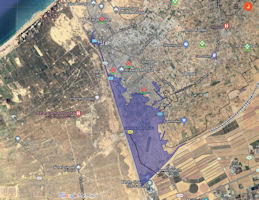

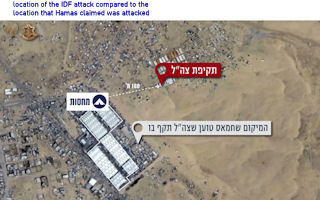
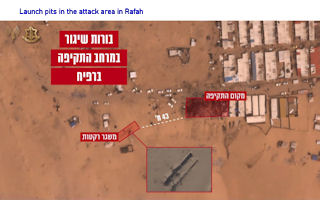
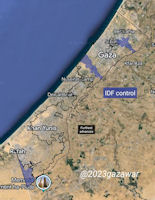
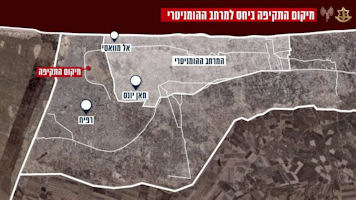
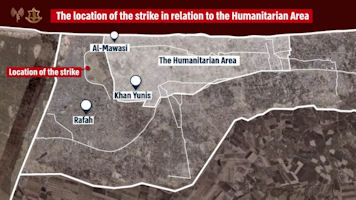
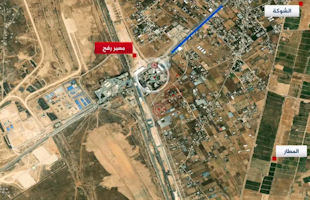
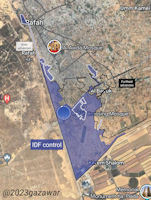
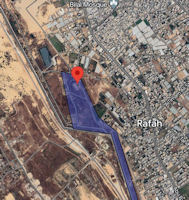
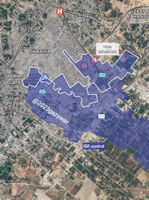

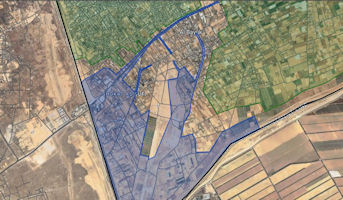
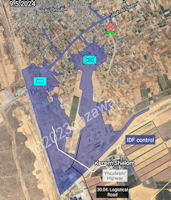
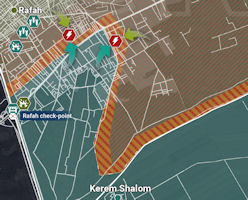
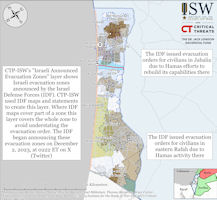

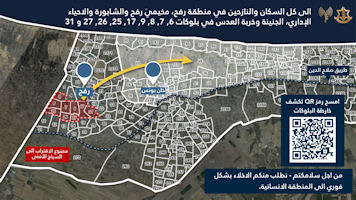

Bystanders
Martin Griffiths, Under-Secretary-General for Humanitarian Affairs and Emergency Relief Coordinator, said "We have said repeatedly that no place is safe in Gaza. Not shelters. Not hospitals. Not the so-called humanitarian zones. We have also warned that a military operation in Rafah would lead to a slaughter. We’ve seen the consequences in last night’s utterly unacceptable attack. Whether the attack was a war crime or a “tragic mistake,” for the people of Gaza, there is no debate. What happened last night was the latest – and possibly most cruel – abomination. To call it “a mistake” is a message that means nothing for those killed, those grieving, and those trying to save lives."
Foreign ministers and representatives of about 40 Arab, Islamic and European countries and international institutions met on Monday to discuss the situation in the Gaza Strip. This coincided with the official recognition by three European countries of the State of Palestine on the borders before June 7, 1967, with East Jerusalem as its capital. The meeting was attended by foreign ministers and representatives of Jordan, Spain, Germany, the UAE, Indonesia, Ireland, Italy, Bahrain, Portugal, Belgium, Bulgaria, Poland, Turkey, the League of Arab States, Algeria, the Czech Republic, Denmark, Romania, Slovakia, Slovenia, Sweden, Switzerland, France, Palestine, Finland, Qatar, Croatia, Latvia, Luxembourg, Lithuania, Malta, Egypt, the United Kingdom, the Netherlands, the Organization of Islamic Cooperation, Austria, Greece.
Two analysts who spoke to Al-Hurra website considered that communication at this level represents great importance in light of the European Union’s possession of pressure cards on Israel, whether economic or security. The American magazine "Politico" quoted statements by Irish Foreign Minister Michael Martin, in which he said that European Union foreign ministers held "for the first time an important discussion about imposing sanctions on Israel if it does not abide by international humanitarian law." Martin told reporters, on Monday, after the European Union Foreign Affairs Council meeting “There was a very clear consensus on the need to support international humanitarian legal institutions”.
Professor of Political Science at Al-Quds University, Ayman Al-Raqab, said that meetings with the European Union are necessary, as the Europeans have “a pressure card represented in partnering with Israel on security or economic files,” noting in his interview with Al-Hurra website that European countries “have become aware of the It is time for the extreme right in Israel, headed by (Prime Minister Benjamin) Netanyahu, to spoil every effort at a solution.” Al-Raqab added that the meetings focused on the two-state solution, without which “the region will enter hell.”
Irish Foreign Minister Michael Martin announced on Monday that European Union foreign ministers held “for the first time an important discussion about imposing sanctions on Israel” if it does not adhere to international humanitarian law, according to what was reported in the American magazine “Politico”. On Friday, the United Nations International Court of Justice ordered Israel to stop its military attack on the city of Rafah in the southern Gaza Strip, and to open the Rafah border crossing to allow more humanitarian aid to enter the Strip without obstacles.
Before the bloc's foreign ministers' meeting, the European Union's foreign affairs official, Josep Borrell, stressed on Monday the necessity of implementing the International Court of Justice's decision calling for stopping the military attacks on Rafah.
But Israel continued to escalate its attacks on Rafah, and its tanks reached the city center, according to what Reuters and Agence France-Presse reported on Tuesday. This was preceded by an air strike on a camp for the displaced, west of the border city with Egypt, in the far south of the Gaza Strip, killing 45 people, according to estimates by the health authorities in the Strip, causing widespread international condemnation of the strike, which the Israeli army said targeted leaders of the Hamas movement.
The Israeli army announced, on Monday, that it had opened an investigation into the raid, after it said, on Sunday, that it had targeted Hamas officials with “precision munitions,” while Netanyahu described the strike as a “tragic incident,” stressing that his government was “investigating it.”
In a related context, political analyst, Abdul Mahdi Mutawa, confirmed in statements to Al-Hurra website that the Arab-European meetings are “very important to create a position far from Israel and the United States.” He added: "The European Union is Israel's first economic partner. I believe that any steps from these countries will have an impact on Israel, even if the Netanyahu government tries to deny it. Every recognition represents a deduction from Israel's credit and credibility and confirms the rights of the Palestinians to an independent state."
He continued that the European position "increases pressure on the United States when the issue of a Palestinian state is raised in the Security Council again," referring to the increase in the number of countries that recognize the State of Palestine and call for granting it full membership in the United Nations, instead of its current observer status. On Tuesday, Spain, along with Ireland, officially recognized the State of Palestine. Norway informed Palestinian Prime Minister Muhammad Mustafa of the decree recognizing the Palestinian state on Sunday.
The European Union's foreign affairs official, Josep Borrell, confirmed on Monday that the decision of the International Court of Justice calling for stopping the military attacks on Rafah must be implemented, before a meeting of the European bloc's foreign ministers and a number of Arab countries in Brussels.
In response to the Spanish decision, Israeli Foreign Minister Yisrael Katz on Tuesday accused Spanish Prime Minister Pedro Sanchez of complicity in “incitement to exterminate the Jews” after his country recognized a Palestinian state. Katz addressed the Spanish Prime Minister, Pedro Sanchez, through his account on the “X” platform, saying: “You are complicit in incitement to exterminate the Jews,” likening the Spanish Deputy Prime Minister, Yolanda Diaz, to the Supreme Leader of Iran, Ali Khamenei, and the head of the political bureau of the Hamas movement in Gaza, Yahya Sinwar, as they all call for “the establishment of a Palestinian Islamic terrorist state from the river to the sea,” according to what was reported by Agence France-Presse.
The three European countries, two of which are members of the European Union (Spain and Ireland), hope that their symbolic initiative will prompt other countries to join it. Israeli Foreign Minister Yisrael Katz accused the Spanish Prime Minister of complicity in “incitement to exterminate the Jews” after his country recognized a Palestinian state.
The issue raises profound differences within the European Union, as other member states, such as France, believe that the time is “not appropriate” now, while Germany does not consider such recognition except as a result of negotiations between the two parties, according to Agence France-Presse. For his part, Al-Raqab pointed out that the continuation of “the Israeli occupation will continue to create hatred for Israel, not only in Gaza, but this will extend to all Palestinian territories and abroad, and the matter has reached Europe and America.” He continued: "The more delay there is, the worse things will get."
While Mutawa explained that these discussions and confessions “are so important that Israel fights them with all its might. Transforming the status of Palestine from an observer state to a full membership means that everything within the 1967 borders is occupied land and all the facilities on it represent a war crime and open a wide door.” To be pursued,” he said. European Union foreign policy official Josep Borrell announced, on Monday, that the bloc is seeking to reach an agreement in principle in order to move forward with the revival of its designated border assistance mission in Rafah, adding that all parties must agree to that step.
The European Union is considering reviving its border assistance mission, known as EUBAM, in Rafah, which has been suspended since 2007, when Hamas took complete control of Gaza, according to Reuters. The Rafah crossing is the main point for entering aid from Egypt, and it has been closed since Israeli forces took control of it from the Palestinian side about three weeks ago. “They gave me approval, the green light politically, to reactivate EUBAM, our mission in Rafah,” Borrell told reporters at Monday’s meeting, which was also attended by prominent Arab ministers. “This could play a useful role in supporting the entry of people into and out of Gaza.”
He added, "But this must be implemented in agreement with the Palestinian Authority, the Egyptians, and of course Israel. We will not do this alone. We will not be assigned to carry out the security mission on the border. We are not a security company." He added that the Union is currently preparing technical plans. For his part, Mutawa stressed that the Arab-European meetings resulted in this European acceptance of renewing the presence of his mission at the Rafah crossing, “which may lead to arrangements to open it again with a European presence, in addition to the encouraging position that the Palestinian Authority should supervise the Gaza Strip with the aim of reaching a political solution.”
The war broke out in Gaza following the unprecedented attack by Hamas (classified as a terrorist group in the United States and other countries) on Israel on October 7, killing about 1,200 people, most of them civilians, including women and children, according to the Israeli authorities. In response to the attack, Israel pledged to “eliminate Hamas,” and has since carried out a bombing campaign followed by ground operations since October 27, resulting in the deaths of about 36,000 Palestinians, most of them women and children, according to what the health authorities in the Strip announced.
Axis of Resistance
The head of the Iranian Islamic Shura Council, Muhammad Baqir Qalibaf, considered that the bombing crimes targeting the displaced and defenseless children would only be committed by Satan, stressing that the world is fed up with the Zionists’ massacres. This came in a blog post published by Qalibaf, today, through his account on the “X” social media platform. Commenting on the recent massacres committed by the criminal Zionist entity against the displaced in the city of Rafah , he stressed that "the world is fed up with these massacres."
The Speaker of the Iranian Parliament also called on all countries, especially Islamic countries, to take consistent steps with their people and other free people around the world, in order to put an end to the genocide in the Palestinian territories. In follow-up to the latest developments, in Rafah today, Tuesday, it was reported that 21 Palestinians were martyred and others injured, in a new massacre committed by the Israeli occupation army, by bombing a camp for displaced people in the Al-Mawasi area in Rafah. This is the third targeting of displaced persons’ tents within 48 hours in areas that the occupation has always claimed are safe and possible to move to.
The Islamic Resistance Movement Hamas, through a statement, condemned these brutal massacres. Calling on the “international community, the Security Council and the International Court of Justice” to take urgent action and take a clear and decisive decision to stop the flagrant violations of international laws by the Zionist entity.
Allied for Democracy
U.S. State Department spokesperson Matthew Miller has reiterated the Biden administration's deep sorrow over the tragic loss of life resulting from an Israeli Defense Forces (IDF) strike in Rafah, which killed dozens of Palestinian civilians sheltering near a targeted compound. "The pain that those families are suffering through must be unimaginable, especially those who’ve lost children and those who have lost family members a repeated number of times," Miller stated.
"As we have said before, Israel has a right to go after the Hamas terrorists responsible for the cold-blooded murder of civilians — as appears to have been Israel’s aim here — and Hamas should stop hiding behind civilians in Gaza. But Israel also has the obligation to do everything possible to minimize civilian harm as it carries out its operations," he said. Miller noted the IDF's explanation that it used one of its smallest bombs to target senior Hamas commanders, causing a secondary explosion that sparked a deadly fire.
The British newspaper " The Guardian " said that the former head of the Israeli intelligence service "Mossad", Yossi Cohen, "threatened" the former prosecutor of the International Criminal Court, Fatou Bensouda, "more than once during secret meetings, to pressure her to abandon the investigation into crimes." War in the Palestinian territories. The newspaper quoted an informed Israeli source as saying, “The Mossad’s goal was to bargain with the Public Prosecutor by threatening or cooperating with regard to Israel’s demands.” While another source said that Cohen was the "unofficial messenger" of Israeli Prime Minister Benjamin Netanyahu.
This information comes as part of a journalistic investigation conducted by “The Guardian” in cooperation with the Israeli-Palestinian magazine “+972” and the Hebrew-language magazine “Local Call,” which reveals how Israeli intelligence agencies conducted a “secret war” against the International Criminal Court for nearly a decade. According to what the British newspaper reported. According to the Guardian, the meetings between Cohen and Bensouda “took place in the years preceding her decision to open an official investigation” into war crimes and crimes against humanity in 2021, an investigation that reached its peak, a week ago, after the announcement of Bensouda’s successor, the current Attorney General, Karim Khan. He is seeking to issue an arrest warrant against Netanyahu and Defense Minister Yoav Galant.
Four sources told the newspaper that Bensouda “informed a small group of senior ICC officials about Cohen’s attempts to influence her.” Three of those sources were aware of Bensouda’s official disclosures to the International Criminal Court on this issue, which they said “revealed that Cohen had put pressure on her on several occasions not to proceed with a criminal investigation into the Palestine issue before the International Criminal Court.” According to accounts shared with ICC officials, Cohen allegedly told her: "You should help us and let us take care of you. You don't want to get involved in things that could jeopardize your security or the security of your family."
According to the British newspaper, the Mossad was also interested in “members of Bensouda’s family, and obtained copies of secret recordings made with her husband,” according to what two sources with direct knowledge of the matter said, explaining that “Israeli officials tried to use these materials to discredit the prosecutor.” The newspaper pointed out that "Israel received support from the former president of the Democratic Republic of the Congo, Joseph Kabila, who played a role in the process of pressuring Bensouda."
Commenting on this, a spokesman for the Israeli Prime Minister’s Office said in contact with the Guardian, “The questions submitted to us are filled with many false and baseless allegations aimed at harming the State of Israel.” Cohen did not respond to a request for comment. Bensouda declined to comment.
The International Criminal Court seeks to issue arrest warrants against leaders of the Hamas movement, led by Yahya Sinwar, Ismail Haniyeh, Israeli Prime Minister Benjamin Netanyahu, and his Defense Minister, Yoav Galant, on charges of committing war crimes and crimes against humanity in connection with the October 7 attacks on Israel and the war that followed. On May 20, the Prosecutor of the International Criminal Court called for the issuance of arrest warrants against the Israeli Prime Minister and Defense Minister Yoav Galant, along with three leaders of the Hamas movement, on the grounds of “committing war crimes.”
The Prosecutor, Karim Khan, issued a statement in which he asked the Pre-Trial Chamber I of the International Criminal Court to “issue arrest warrants in connection with the situation in the State of Palestine.” These requests included, in addition to Netanyahu and Gallant, Hamas leaders Yahya Sinwar, Ismail Haniyeh, and Muhammad Diab (the guest). The statement added that the latter trio "bear criminal responsibility for the following war crimes and crimes against humanity committed in the territories of Israel and the State of Palestine (in the Gaza Strip) as of at least October 7, 2023."
Khan continued in the statement: “Based on the evidence collected and examined by my office, I have reasonable grounds to believe that Benjamin Netanyahu, Prime Minister of Israel, and Yoav Galant, Minister of Defense of Israel, bear criminal responsibility for the following war crimes and crimes against humanity committed on the territory of the State of Palestine.” (In the Gaza Strip) as of at least October 8, 2023.”
Regarding Netanyahu and Gallant, Khan indicated that the crimes for which he believes they are responsible are “starvation of civilians as a method of warfare as a war crime, and intentionally causing great suffering, serious injury to body or health, or cruel treatment as a war crime.” And also “premeditated murder or killing as a war crime, intentionally directing attacks against a civilian population as a war crime, extermination and/or willful killing, including in the context of death resulting from starvation, as a crime against humanity, and persecution as a crime against humanity.” Regarding Netanyahu and Gallant, the statement continued, “The crimes against humanity with which they were charged were committed as part of a widespread and systematic attack against the Palestinian civilian population in accordance with state policy. These crimes continue, in our assessment, to this day.” The Prosecutor argued that the evidence he collected “proves that Israel deliberately and systematically deprived the civilian population in all areas of Gaza of materials indispensable for their human survival.”
The Attorney General's statement continued, "Israel has the right to take measures to defend its population, as do all states. However, this right does not absolve Israel or any state from its obligation to comply with international humanitarian law. Regardless of any military objectives Israel may have, The methods it has chosen to achieve these objectives in Gaza - namely, intentionally causing death, starvation, severe suffering and serious injury to body or health among the civilian population - are criminal.
Operation Iron Swords - By the Numbers
- 1,900,000 IDPs in Gaza
- 81,136 Gazans injured, 28% adult male
- 70,000 tons of explosives dropped on Gaza
- 70,000 Gaza housing units completely destroyed
- 70,000 Israeli IDPs from Lebanon border
- 45,000 bombs dropped in Gaza
- 45,000 Gazans killed, including buried under rubble
- 36,096 Gazans martyred
- 33,000 Gaza targets attacked
- 20,528 Palestinians in Israeli prisons [Haaretz, 20 Mar 2024]
- 15,140 Israelis injured [i24 TV]
- 15,000 terror operatives killed in Gaza [Israeli officials]
- 15,000 rockets launched from Gaza
- 14,520 Gazan children martyred
- 13,000 HAMAS combatants killed [N12]
- 13,000 HAMAS combatants killed [IDF]
- 11,000 arrested by Israelis in the West Bank in 2023
- 10,000 Gazans missing under the rubble
- 9,920 Gazan women martyred
- 9,400 Palestinians in Israeli prisons
- 9,000 IDF needing psychological assistance
- 8,890 arrested by Israelis in the West Bank since Oct.7th
- 7,209 IDF injured admitted to rehabilitation [IDF]
- 6,800 IDF officers and soldiers injured [Channel 12]
- 6,000 HAMAS combatants killed [HAMAS]
- 5,500 IDF wounded [reports]
- 5,000 West Bank Palestinians wounded
- 4,700 sites targetted in Lebanon
- 3,850 wanted persons arrested throughout Judea and Samaria
- 3,600 administrative detainees
- 3,188 IDF wounded [IDF]
- 2,100 Gazan women are missing
- 1,609 terrorists killed on the first day
- 1,650 wanted persons arrested throughout Judea and Samaria affiliated with Hamas
- 1,160 Israelis killed on the first day
- 635 Israeli officers and soldiers killed since the start of the war
- 518 West Bank Palestinians martyred
- 364 people [including fighters] killed in Lebanon
- 283 Israeli officers and soldiers killed in Gaza
- 240 Hezbollah fighters killed in Lebanon
- 126 people recovered, including 91 Israelis, 11 bodies, and 24 foreign workers
- 86 living hostages in Palestinian custody
- 70 civilians killed in Lebanon
- 39 dead hostages in Palestinian custody
- 29 IDF deaths were caused by "friendly fire"
- 15 Israelis killed in the West Bank and Israel
Not every number is reported every day, so sudden jumps generally reflect reporting artifacts rather than actual upticks. Many of these numbers fluctate, up and down, with no apparent explanation. This list records the highest number reliably reported for each matter, under the theory that reality with catch up with reports, as is relentlessly the case.
Some reports claimed that the UN cut in half its earlier estimates of women and children killed in Gaza. Initially, they reported 9,500 women and 14,500 children killed, but later revised it to 4,959 women and 7,797 children on 08 May 2024. The UN acknowledged its inability to independently verify casualty figures. The seeming discrepancy is that HAMAS had about 10K KIA bodies on hand for which they do not have positive ID. It is possible to report the gender and approximate age [ie, juvenile] without knowing the name of the deceased.

|
NEWSLETTER
|
| Join the GlobalSecurity.org mailing list |
|
|
|

